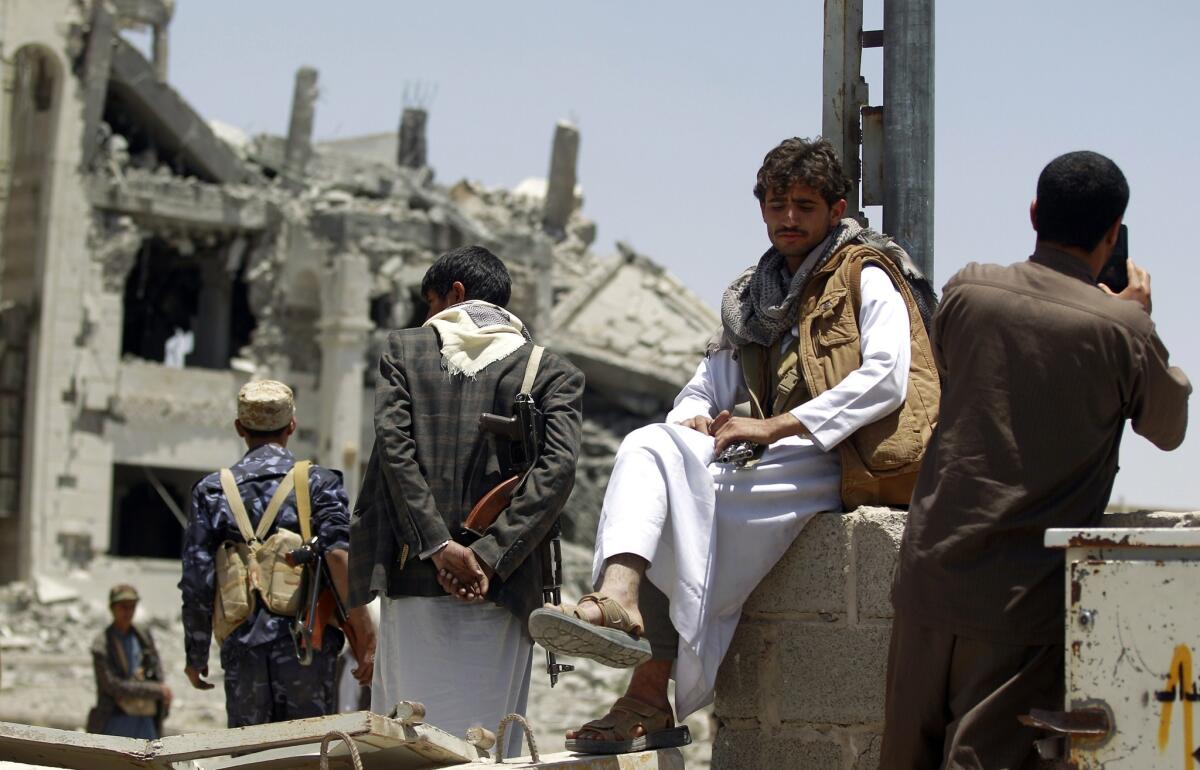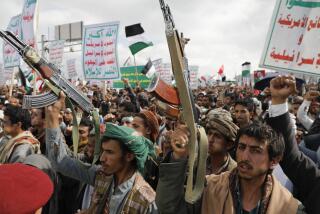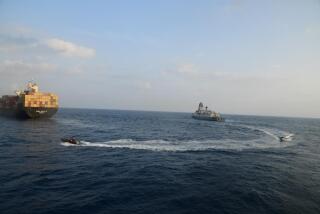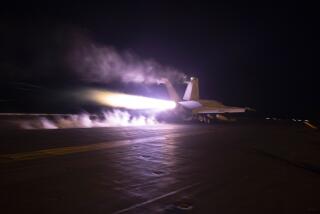Saudi-led airstrikes damage airport in Yemeni capital, disrupting aid

Houthi rebels look at the damage in the yard of the residence of their military commander after an airstrike destroyed the property in the Yemeni capital, Sana, on April 28.
A wave of Saudi-led airstrikes in Yemen on Tuesday seriously damaged Sana’s international airport, dealing a blow to already faltering efforts to bring in desperately needed humanitarian aid and arrange evacuation flights for those trapped by fighting.
All parties to the Yemen conflict have accused one another of hampering deliveries of medical supplies, food and other commodities that are in perilously short supply after more than a month of battles. A Saudi Arabia-led coalition launched a campaign of airstrikes on March 26 aimed at driving back Shiite Muslim Houthi rebels who have overrun much of Yemen.
Fierce combat was reported Tuesday in the oil-producing province of Marib, east of Sana and the site of electrical facilities that power the capital. As it is, electricity is only on in Sana for about an hour a day, residents say, and more damage in Marib could result in even less power being generated.
The Marib fighting has killed about 60 people since Monday, officials reported. Other intense clashes were taking place in Aden, the southern seaport that is Yemen’s main commercial hub, and the city of Taizz, which lies at a strategic crossroads between Aden and the capital.
In a grim pattern that has persisted since the earliest days of the conflict, civilian casualties continued to mount as fighting raged in residential areas. An apparent airstrike hit a home in Aden, killing four members of one family, officials said, though some accounts instead blamed an artillery strike by the insurgents and their allies.
The fighting in Yemen involves a tangle of combatants. In Marib, Sunni Muslim tribesmen have banded together to fight the advancing Houthis. In Aden, the rebels are confronting militias loyal to President Abdu Rabu Mansour Hadi, who has fled to Saudi Arabia.
Yemen’s army has split into units remaining allied with Hadi and those taking the side of Ali Abdullah Saleh, the strongman deposed in 2012. Also in the volatile mix is Al Qaeda’s local branch, which has gained some Sunni tribal recruits eager to take on the Houthis and is seeking to seize wealth and territory amid the chaos.
The bomb damage to Sana’s airport comes as aid groups warn of a burgeoning humanitarian catastrophe triggered by the conflict. Until Tuesday, some United Nations and Red Cross flights had been able to land in the capital, but the latest bombardment appeared to have targeted the terminals and may have rendered the single runway unusable, wrecking a commercial plane belonging to a domestic Yemeni airline.
The chief Saudi military spokesman, Brig. Gen. Ahmed Asiri, told the Saudi-owned news channel Al Arabiya that the runway was bombed after an Iranian plane sought to “defy” calls to first land at a Saudi airport to be searched for potential weapons before heading on to Sana. Iran denies supplying arms to the insurgents.
Yemen has become a proxy battleground for regional powers Saudi Arabia and Iran, and the fighting has sharpened sectarian rivalries. Saudi Arabia’s Sunni royal family, led by the recently crowned King Salman, has taken a hard line against the growing regional influence of Shiite Muslim Iran, while the Tehran government has used increasingly harsh rhetoric to condemn the Saudi intervention.
Calls have grown for a cease-fire and a negotiated settlement, but the warring parties have shown little will to come to terms. With impoverished Yemen sliding toward failed statehood, there are fears that yet more militant groups will flourish in its remote reaches. A heavy naval presence, including U.S. warships, is securing the shipping lanes that lie alongside Yemen, at the mouth of the Red Sea.
Special correspondent Al-Alayaa reported from Sana and Times staff writer King from Cairo.
Follow @laurakingLAT on Twitter for news out of the Middle East
More to Read
Start your day right
Sign up for Essential California for news, features and recommendations from the L.A. Times and beyond in your inbox six days a week.
You may occasionally receive promotional content from the Los Angeles Times.






